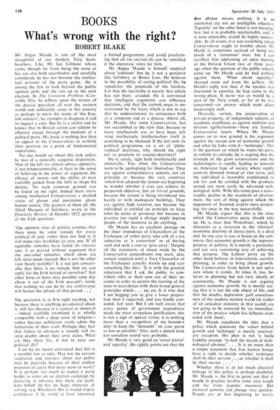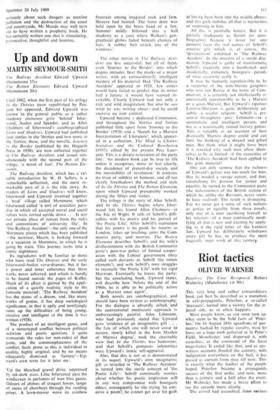BOOKS
What's wrong with the right?
ROBERT BLAKE
Mr Angus Maude is one of the most thoughtful of our modern Tory back- benchers. Like Mr Ian Gilmour whose views, though far from being the same as his, are also both unorthodox and carefully considered, he has not become the intellec- tual prisoner of the party game. He is among the few to look beyond the public opinion polls and the run up to the next election. In The Common Problem (Con- stable 42s), he reflects upon the nature of the disease prevalent all over the western world and sufficiently acute in this country as perhaps to merit the name of 'the Eng- lish sickness'; he attempts to diagnose it and to suggest a cure. But he is a realist and he knows that in Britain action can seldom be effective except through the medium of a political party. His book is nothing less than an appeal to the Conservatives to re-think their position on a point of fundamental importance.
No one would set about this task unless he was of a naturally sanguine disposition. Men of the left are almost always optimists, if not temperamentally, at least in the sense of believing in the power of argument, the efficacy of reason and the ability of man (suitably guided from the left) to shape his destiny. No such common ground can be found on the right. Indeed there exists among intellectual Conservatives a marked strain of gloom and pessimism about human nature. The greatest of them all, the Third Marquis of Salisbury, wrote in the Quarterly Review of October 1872 apropos of the Irish question:
`The optimist view of politics assumes that there must be some remedy for every political ill and, rather than not find it, it will make two hardships to cure one. If all equitable remedies have failed its votaries take it as proved without argument that the one-sided remedies, which alone are left, must needs succeed. But is not the other view barely possible? Is it not just conceiv- able that there is no remedy that we can apply for the Irish hatred of ourselves? that other loves or hates may possibly some day elbow it out of the Irish peasant's mind, that nothing we can do by any contrivance will hasten the advent of that period .
The quotation is at first sight startling, not because there is anything paradoxical about it, still less because it is cynical or immoral —indeed carefully examined it is wholly compatible with a deep sense of religion— rather because politicians rarely admit the limitations of their craft. Perhaps they fear that failure to advocate a remedy will in- spire doubts about their own status. What are they there for, if not to cure our political ills?
1 am by no means convinced that this is a sensible line to take. May not the current scepticism and sourness about our public men be precisely because of their endless promises of cures that never seem to work? It is perhaps too much to expect a party leader to enter on an election campaign by declaring in advance that there are prob- lems wvMoh'• he 'has no 'hope whatever of solving. (e.g. Rhodesia). But it would inspire confidence if he could at least announce
a limited programme, and avoid proclaim- ing that all our current ills can be remedied if the electorate votes for him.
Mr Angus Maude is himself sceptical about 'solutions' but he is not a pessimist like Salisbury or Bonar Law. He believes in the possibility of curing political ills; he repudiates the jeremiads of the fatalists. For him the inevitable is merely that which has not been avoided. He is convinced that intelligent arguments can influence decisions, and that the current angst is un- warranted by the facts; which is not to say that he underestimates its seriousness both as a symptom and as a disease. Above all, Mr Maude, like some Conservatives, has not succumbed to the view that, because so many intellectuals are, or have been, left wing intellectuals, intellectualism itself is something to be shunned. If the left rests its political programme on a set of 'philo- sophical' doctrines, why should the right not so proclaim its counter-doctrines?
He is, surely, right both intellectually and electorally. Too often the Conservatives seem to be apologising for themselves. They are against comprehensive schools, not on principle or because the very countries which first adopted the system are beginning to wonder whether it ever can achieve its purported objective, but on trivial grounds, because the system is being introduced too hastily or with inadequate buildings. They are against high taxation, not because the individual is entitled on principle to keep what he earns or possesses but because in practice too rapid a change might deprive people of the incentive to do anything.
Mr Maude has an excellent passage on the sheer impudence of Chancellors of the Exchequer of either party who talk of a tax reduction as 'a concession' or of having such and such a sum to 'give away'. Despite all the statements of intent made by the Conservative panjandrums one must, alas, remain sceptical until a Tory Chancellor of the Exchequer actually stands up and says something like this: 'It is with the greatest reluctance that I ask the public to con- tribute (this or that) sum out of their in- comes in order to sustain the running of the state in accordance with those broad general principles which . . . etc etc. It is true that I am begging you to give a lower propor- tion than I requested, and you kindly con- ceded, last year. But I am well aware that every penny of government expenditure needs the most scrupulous justification; this is not a sign of special virtue; it is nothing more than a recognition of my bounden duty to keep the "demands" on your purse as low as possible.' Alas, such a speech does not somehow sound very probable.
Mr Maude is very good on 'social justice' and 'equality'. He rightly points out that the first phrase means nothing; it is an emotional cry not an intelligible objective.
`Equality' on the other hand is not meaning- less; but it is probably unattainable, and, tf it were attainable, would be highly undesir- able. At all events it is not something which Conservatives ought to trouble about. Mr Heath is sometimes accused of being too
much of a 'consensus' man, but I can
recollect him addressing an open meeting at the Oxford Union two or three years ago when the question of the public schools came up. Mr Heath said he had nothing against them. 'What about equality?'
shouted some oaf from the gallery. Mr Heath's reply was that, if the speaker was interested in equality, he had come to the wrong place. It never was or would be a part of the Tory creed, as far as he was concerned—an answer which went down surprisingly well.
Diversity, variety, the preservation of private property, of independent schools, of academic excellence, as against uniform and envious egalitarianism—these are familiar Conservative tenets. Where Mr Maude comes on to new ground is his argument against the sacred cow of economic growth and what he links with it—`technique'. This
is the question on which he wants his party
to rethink its attitude; he is arguing that the triumph of the giant corporations and the technologists is rapidly leading us towards an American type of society where supply controls demand instead of vice versa, and the individual is insensibly conditioned :o ask for and be satisfied with the products turned out most easily by advanced tech- nological skills. With this trend goes a catas- trophic decline in the standards of environ- ment, the sort of thing against which the opponents of Stansted airport were protest- ing, for once in the way successfully.
Mr Maude argues that this is the issue which the Conservative party should take up. He is clear that `Powellism', which he
interprets as a reversion to the 'classical' economic doctrine of laissez-faire, is a dead
end. In any case it, too, is based on the con- sensus that economic growth is the supreme purpose of politics. It is merely a particular and not very convincing way of achieving that purpose. The Labour party on the other hand believes in intervention, socialist planning, in order to bring about growth.
The Conservative front bench is not quite sure where it stands. At times it, too, be- lieves in planning but not very clearly or consistently. Mr Maude is not arguing against economic growth; he is merely say- ing that it is not the sole object of life, and that the doubts, depression, guilt conscious- ness of the modern western world (or rather of an articulate minority in that world) are not going to be removed by 'an intensifica- tion of the process which has hitherto coin- cided with them'.
Mr Maude repudiates the idea that a policy which questions the values behind growth and 'technique' is merely reaction- ary escapism. His plan is not 'a futile Luddite attempt "to halt the march of tech- nological advance" . . . It is no more than a simple statement that free human beings have a right to decide whether technique shall be their servant .. , or whether it shall be their master . . . '
Whether there is as yet much electoral mileage in this policy is perhaps doubtful. Mr Maude is the first to point out that it would in practice involve some very tough and far from popular measures. But electoral patterns can change very quickly. People are at last beginning to worry seriously about such dangers as massive pollution and the destruction of the coast and countryside. Mr Maude may well turn out to have written a prophetic book. He has certainly written one that is stimulating, provocative, thoughtful and humane.



































 Previous page
Previous page